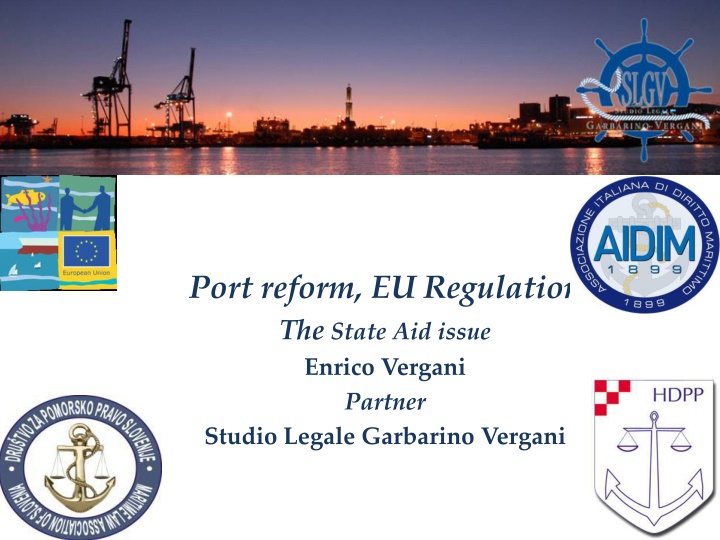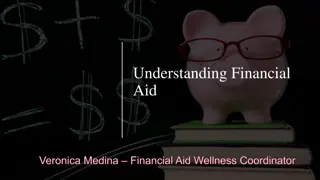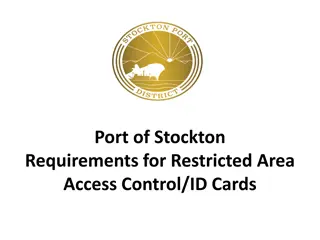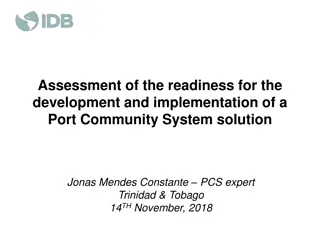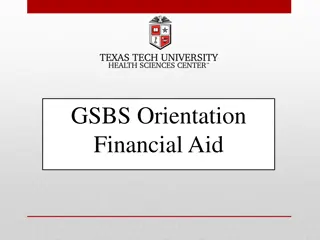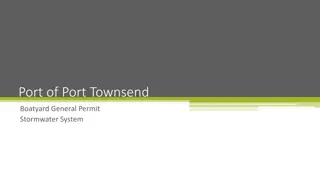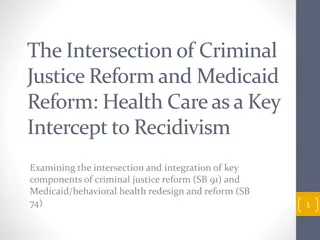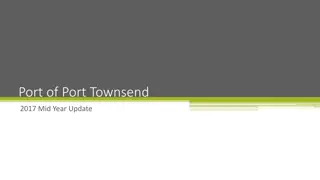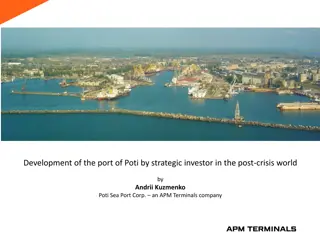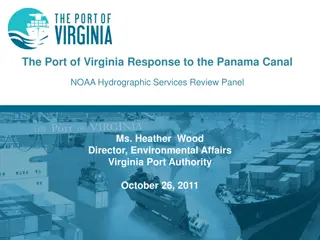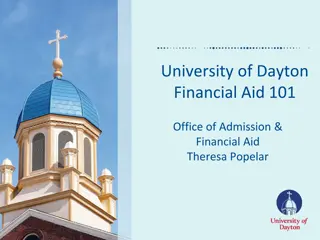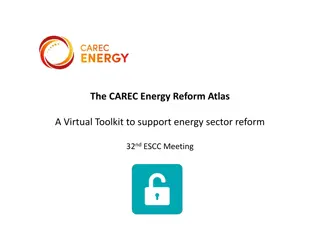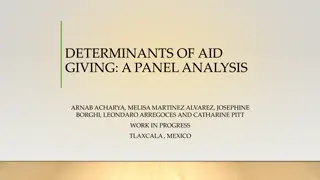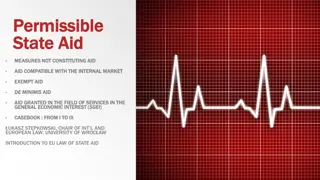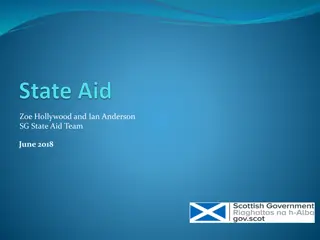EU Port Reform and State Aid Regulation Overview
The content delves into EU port reform and state aid regulation issues, discussing the significance of EU ports, state aids to seaports, domestic legislations, port management models, and legal aspects related to aids granted by member states. The European Parliament and Council's regulations, along with the general block exemption regulation, are referenced. The content emphasizes the compatibility with the internal market and outlines derogations allowed under Article 107 TFEU.
Download Presentation

Please find below an Image/Link to download the presentation.
The content on the website is provided AS IS for your information and personal use only. It may not be sold, licensed, or shared on other websites without obtaining consent from the author.If you encounter any issues during the download, it is possible that the publisher has removed the file from their server.
You are allowed to download the files provided on this website for personal or commercial use, subject to the condition that they are used lawfully. All files are the property of their respective owners.
The content on the website is provided AS IS for your information and personal use only. It may not be sold, licensed, or shared on other websites without obtaining consent from the author.
E N D
Presentation Transcript
Port reform, EU Regulation The State Aid issue Enrico Vergani Partner Studio Legale Garbarino Vergani
EU Ports: what we are talking about 1,200 Ports within the European Union 74% of import / export 37% of intra-EU commercial transactions 3,000,000.00 people employed by the Port system 392 ports within TEN-T [Trans European Transport Network]
References Regulation of the European Parliament and the Council establishing a framework on market access to port services and financial transparency of ports EU Commission Targeted review of the General Block Exemption Regulation (State aid): extension to ports and airports consultation period Directorate General Transport and Tourism State Aids to EU Seaports (Study 2011)
Domestic legislations. The question of whether Member States could or should finance port infrastructures depends entirely on their transport and economic policies and the organisation of their seaports
Port management models and responsabilities Public service port Tool port Landlord port Private service port
Article 107 TFEU [definition of incompatible aid] 1. Save as otherwise provided in the Treaties, any aid granted by a Member State or through State resources in any form whatsoever which distorts or threatens to distort competition by favouring certain undertakings or the production of certain goods shall, in so far as it affects trade between Member States, be incompatible with the internal market.
Article 107 TFEU [de iure derogations] 2. The following shall be compatible with the internal market: (a) aid having a social character, granted to individual consumers, provided that such aid is granted without discrimination related to the origin of the products concerned; (b) aid to make good the damage caused by natural disasters or exceptional occurrences; (c) aid granted to the economy of certain areas of the Federal Republic of Germany affected by the division of Germany, in so far as such aid is required in order to compensate for the economic disadvantages caused by that division. Five years after the entry into force of the Treaty of Lisbon, the Council, acting on a proposal from the Commission, may adopt a decision repealing this point.
Article 107 TFEU [discretionary derogations] 3. The following may be considered to be compatible with the internal market: (a) aid to promote the economic development of areas where the standard of living is abnormally low or where there is serious underemployment, and of the regions referred to in Article 349, in view of their structural, economic and social situation; (b) aid to promote the execution of an important project of common European interest or to remedy a serious disturbance in the economy of a Member State; (c) aid to facilitate the development of certain economic activities or of certain economic areas, where such aid does not adversely affect trading conditions to an extent contrary to the common interest; (d) aid to promote culture and heritage conservation where such aid does not affect trading conditions and competition in the Union to an extent that is contrary to the common interest; (e) such other categories of aid as may be specified by decision of the Council on a proposal from the Commission.
undertakings (art. 107 TFEU) any entity engaged in an activity of an economic nature which offers goods and services on the market regardless of its legal status and the way in which is financed European Court of Justice Leipzig Halle T-455/08 A roport de Paris Commission T-128/98 C-82/01P Ryanair Ltd. Commission T-196/04 EU Commission SA.38302 (2014/N) Port of Salerno
Antwerp Port Authority PSA Antwerp NV and Antwerp Gateway NV whether reductions in compensation payments granted by the Port of Antwerp to two container terminal operators gave them an undue advantage over competitors, in breach of EU state aid rules. [EU Commission in depth investigations (January 2016)]
Conclusions Public financing of seaport infrastructures (both basic and terminal infrastructures) has been very common in EU Current trend in port policies slowly moving towards and increased involvement of the private sector The public financing scheme of seaport infrastructures could distort competition between ports and operating companies within EU. Cross subsidies (separation of accounts) Contingent vs. structured planning approach Ports as a part of a bigger structured transport network Clear guidelines and possible exemptions as opposed to command and control approch
